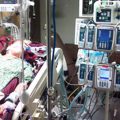Podcast: Play in new window | Download
Subscribe: Apple Podcasts | RSS
Hi, it’s Patrik Hutzel from INTENSIVECAREHOTLINE.COM where we instantly improve the lives for Families of critically ill Patients in Intensive Care, so that you can make informed decisions, have PEACE OF MIND, real power, real control and so that you can influence decision making fast, even if you’re not a doctor or a nurse in Intensive Care!
This is another episode of “YOUR QUESTIONS ANSWERED“ and in last week’s episode I answered another question from our readers and the question was
You can check out last week’s question by clicking on the link here.
In this week’s episode of “YOUR QUESTIONS ANSWERED” I want to answer questions from one of my clients Lara, as part of my 1:1 consulting and advocacy service! Lara’s mother is critically ill in ICU with a hemorrhagic stroke and Lara is asking how can she can reverse the DNR status of her mom?
My Mom is Critically Ill in ICU with a Brain Injury.
How Can I Reverse the DNR status of my Mom?

“You can also check out previous 1:1 consulting and advocacy sessions with me and Lara here.”
Lara: And if you wanted to complain about the consultant?
Patrik: That would probably best be on a hospital level, like on an executive level. Like probably director of nursing or even a CEO level.
Lara: Right, I understand.
Patrik: Okay. Look, I’ll let you go. I’ve got another call coming in. I’m so sorry. I will then email you the consulting options. Okay?
Lara: Okay, Sure.
Patrik: And I’ll wait to hear from you then.
Lara: Thank you so much.
Patrik: Thank you. All the best for now. Bye bye.
Lara: Thanks. Thank you.
Patrik: Bye. Bye.
RECOMMENDED:
Lara: Hello, Patrik.
Patrik: Hi, Lara. How are you?
Lara: I’m okay. Thank you for calling me.
Patrik: You’re very welcome.
Lara: Actually the original plan was that my sister is going to the hospital, she was going to get an update and then when I go. But later then, we asked the doctors again to see us. But we just thought about it and actually, because they can be very busy. Even though we asked quite a few times, they might not come the second time. So I thought, I would speak to you and then I might fix the doctors in. I could always call you straight up again.
Patrik: Absolutely.
Lara: I think the first thing I wanted to work on was the DNR. Actually to be honest right this moment because they just say it to you right away? They don’t even think about it. But it’s good that you reminded me.
Patrik: Yes. So I’ll tell you what the first thing to get that removed is really… So when the issue with NFR or DNR, it sounds to me like they have not consulted you or consented you, as the medical power of attorney. Does that make sense?
Lara: Yeah.
RECOMMENDED:
Patrik: Okay. So because in some instances they don’t have to consent you, but at the bare minimom, they have to consult you. And they haven’t done that. It just sounds to me like they’ve just issued it without consulting you or your sister. Right?
Lara: I mean they did tell us.
Patrik: But that’s not consulting.
Lara: Okay.
Patrik: They told you, that’s a matter of fact. The reality is if your mom is DNR, if her heart was to stop now, they would not resuscitate her. So keep that in mind, and that would be against your wishes. So where does that lead us in terms of getting that removed? You will number one, need to mention to them, or we can do it together if you like. You can’t just issue a DNR without the bare minimom consulting the family, get their views. They haven’t asked you your views?
Lara: Yes.
Patrik: Right. I mean this is a life or death decision and they take it so lightly because they do it every day and families don’t question. So that’s number one, and number two, there is a hospital policy around DNR and again, there’s a very good chance they’ve breached their own hospital policy. That hospital policy or ICU policy would say something along the lines of either consent or consult the medical power of attorney either or. And either way they haven’t done either.
Patrik: So they’ve breach their own hospital or ICU policy. So that’s the way to go about that, but in the beginning, you don’t even have to mention the policy. Because you could just say, hey, you mentioned to us the other day my mother, has a DNR we don’t want that please take it off. That’s the way you should approach this to begin with. Because you can say, we thought about this. She’s now moving, she seems to be alert and responsive. That would be your line of argument to begin with. However, if for whatever reason that’s falling on deaf ears, that would be the next step to take, if that makes sense.
RECOMMENDED:
Lara: Yeah, that’s right.
Patrik: Always argue on a clinical level first and the clinical level is she’s responding. And then you could slow down the policy track. Remind me, whereabout in the UK are you? Whereabout?
Lara: I’m in suburbs.
Patrik: Big hospital? Small hospital?
Lara: It’s actually a big hospital.
Patrik: Okay. I used to work in the UK many years ago. I used to work in Manchester and in Liverpool.
Patrik: And that’s important to know, because in a big ICU, unfortunately, your mom is a number, in a smaller ICU it’s a bit more personalised, but in a big ICU, your mom, unfortunately, is a number. Then let’s go to the next thing with the feeds.
Lara: So they haven’t-
Patrik: Sorry, before we go on, what I can do if you want me to, I can record this call and then I can send you the recording as well. You can listen to it again if you want to.
Lara: Yes please.
Patrik: Then feeds, you wanted the feeds we start it?
Lara: Yes please. And what they’ve said is that if she is not responding to the antibiotics, then that they’re going to have a discussion and completely stop it next week. But that’s not fair to stop someone’s feeds.
RECOMMENDED:
Patrik: Not at all. They haven’t done that yet. Have they?
Lara: They haven’t, but they said that just yesterday, but they would think about those line if she wasn’t responding.
Patrik: Okay. Let me ask you a couple of questions in regards to that. Number one, have you heard the term Glasgow Coma Scale or GCS? Have they mentioned that?
Lara: I think they may have, I don’t really remember. I think what they said to me is that, they look at a rating.
Patrik: There is a rating. Do you know what rating she’s on? Have you got any idea? Would be very helpful to know that.
Lara: No I don’t. I can ask.
Patrik: You can ask or let’s very quickly run through that. Would she be squeezing your fingers if you asked her to.
Lara: She was with her right hand, but they’ve covered it with a mitten.
Patrik: That’s terrible.
Lara: Because she would squeeze her hand.
Patrik: That’s terrible. Are you in front of a computer?
Lara: No, I just got a paper actually.
Patrik: Okay. Can you access your email?
Lara: Yes.
Patrik: I’ve just sent you an email just right now. I attached a Glasgow Coma Scale if you can quickly open that. Because once we know the Glasgow Coma Scale every argument that we make will be so much easier potentially. I’ve just sent it to you. Can you see that?
Lara: Yeah. I see it.
Patrik: Can you open it?
Lara: Yes. I have it open.
Patrik: Okay. So, when you look on the top, you see open eyes?
Lara: Sorry?
Patrik: Do you see your mother opening eyes?
Lara: No, she’s not opening her.
Patrik: That’s okay. Would she be opening eyes to speech or to pain stimulus?
Lara: No.
Patrik: No. That’s okay. She’s not talking, I would imagine?
Lara: No, she’s not, she’s making humming noises just the last day.
Patrik: Right, Okay. So you said she would be squeezing fingers, is that what you’re saying?
RECOMMENDED:
Lara: Yes. She was squeezing our fingers, then they covered her hands because she was pulling out her nose sleeve.
Patrik: And that would be consistently, it wouldn’t be a one off with her squeezing fingers?
Lara: Actually I can’t remember now, because it was just on the first day, but I think she was squeezing us.
Patrik: So if you look at that Glasgow Coma Scale, start from the bottom, for now, she would get a six for obeying commands. she would probably get either a one or a two for a verbal response. So let’s just go with the two, that’s eight and then best eye opening is no response, is that correct at the moment?
Lara: Yeah. That’s right.
Patrik: Okay. So, that would be-
Lara: But she does understand, it’s just that she physically can’t do it. It not that she isn’t aware of what to do thereafter. And then when she gives a response she just says that she’s not able to. So it’s more of a weakness.
Patrik: So, that brings her up to a nine. If you quickly look at the total score below, the base response is obviously 15. A score eight or less, it’s not great, but a nine brings her just right above where there’s something there and they need to work with that. So for example, if we were to talk to the doctors and they would say, we’re going to stop the feeds, my argument would be with the GCS of nine, there is no way you would stop the feeds.
RECOMMENDED:
Patrik: Because she’s obeying commands. If she’s obeying commands that means the brain is working to a degree. So the level of argument there would be, well, with the GCS of nine, there’s no way you would stop the feeds. Because the reality is if she’s squeezing hands on command, there’s a very good chance she will open her eyes when she’s ready. The other thing is the line of argument around stopping feeds really this could be deemed as murder really. I’m all for working with people, but sometimes you have to call it out. And especially big unit, your mom seems to be a number in there. They’re busy, they’re not tending to you and sometimes you just have to make a few waves.
Lara: Yeah. In that extent.
Patrik: Sometimes you just have to say, I would not want you to stop my mother’s feeds because you’re going to kill her and that could be deemed as murder. The other thing is you also want to be prepared for anything else they’re going to… Let’s just say you would let DNR slip or you wouldn’t let the feed slip. If there’s any deterioration, they will say we knew she would deteriorate. That’s why we’ve issued DNR, we knew she would deteriorate that’s why we talked about stopping the feeds. You’ve got to go in the other direction now, because any deterioration they will use against your mom.
Patrik: So, you’ve got to go in the other direction. They’re going in one direction, which is from their perspective, it’s all doom and gloom, it’s all negative, it’s all about she wouldn’t have any quality of life and you’ve got to go in the other direction. You’ve got to say, hey, she’s got a GCS of nine that’s pretty good. And it’s actually pretty good after hemorrhagic stroke. And also not feeding her, for example, would rob her of calories, it would rob her off nutritional energy she needs all of that. That wouldn’t be fair on her. It wouldn’t help her recovery. Tell me a little bit more about what she ventilated when she first went in there.
RECOMMENDED:
Lara: No, she’s breathing by himself. All they’re doing is they’re just adding a little pipe of oxygen in her nose because it was just dropping here and there, but that’s because she’s fighting an infection and she was underway anyway. So that’s fine then her heart kicking itself, she not using a machine to pump her blood. So that’s all good, but the other thing was actually… Sorry I forgot what I was saying.
Lara: I’ve forgotten my chain of thought now. So yeah, that’s working. Sorry, the other thing I wanted to talk about with you was, she already had some preexisting medical condition. Where she was already taking a supplement drink very similar activities Vital Cow 1.5. And so they need to take that into consideration because, not only was she on daily antibiotics. But she was also on Vital Cow to help her need nutrition. I want to say to them, but you’re not taking that into consideration. It’s not just that they’re stopping food. On top food daily she had to have the exact same thing. It was a supplement base that she has to have to help her absorption. So it’s not just to do with the fact that she can’t swollen.
Patrik: And how long was she taking this for and what other pre-medical conditions did she have?
Lara: So she had a problem with her celiac disease and diverticulum. So she had malabsorption, she was doing better and the drink had to help her to get through. I wanted to just talk about her pre-existence, because she again was on daily antibiotics and Co-Amoxiclav. Which is what they’re giving her now, but they’re giving her a much higher dose and Vital Cow, two times a day. She was drinking that drink, on top of food. But she had to chew one thing, so really they’re stopping it’s like if they had a diabetic person and they needed insulin, they wouldn’t stop that?
Patrik: No, of course, no.
Lara: They wouldn’t, would they?
Patrik: No. Of course not. So the other important factor is, have you ever discussed the situation like that with your mother prior? Has it ever been a point of discussion between you and your mom or between other family members?
Lara: We know her as a person, she’s been through in and out of hospital for the last few years, even though people do get upset, she still always fights. And even if one of us comes through there that evening and something’s really feeling bad, she even goes to a corridor until they cooled even though she’s not fully recovered. She would ask us to call the nurse if they’re ignoring her.
Patrik: Yeah. Is this something you could-
Lara: And she had a lot to look forward to, she wasn’t upset with that, she was really happy actually.
Patrik: Are they aware of that?
RECOMMENDED:
Lara: No, I’d need to say it to them to be honest this could help me before that they make you feel upset and then you just don’t pay again. But I didn’t want that.
Patrik: And that would be another line of argument for the DNR. So with the DNR, you go back to them and you say, Hey, we’ve discussed this with our mom before this event, what she wants in a situation like that. And she clearly wants to live, she clearly wants to fight, she has a lot to look forward to. And besides, she’s now moving, she’s squeezing my fingers. And the other thing is do you know at the moment with the GCS, do you know how often they’re checking it? Are they checking it every hour? Do you know?
Lara: I know that there’s daily but I don’t know if it’s hour.
The 1:1 consulting session will continue in next week’s episode.
How can you become the best advocate for your critically ill loved one, make informed decisions, get peace of mind, control, power and influence quickly, whilst your loved one is critically ill in Intensive Care?
You get to that all important feeling of making informed decisions, get PEACE OF MIND, CONTROL, POWER AND INFLUENCE when you download your FREE “INSTANT IMPACT” report NOW by entering your email below!
In Your FREE “INSTANT IMPACT” report you’ll learn quickly how to make informed decisions, get PEACE OF MIND, real power and real control and how you can influence decision making fast, whilst your loved one is critically ill in Intensive Care! Your FREE “INSTANT IMPACT” Report gives you in-depth insight that you must know whilst your loved one is critically ill or is even dying in Intensive Care!
Sign up and download your FREE “INSTANT IMPACT” REPORT now by entering your email below! In your FREE “INSTANT IMPACT” REPORT you’ll learn how to speak the “secret” Intensive Care language so that the doctors and the nurses know straight away that you are an insider and that you know and understand what’s really happening in Intensive Care! In your FREE report you’ll also discover
- How to ask the doctors and the nurses the right questions
- Discover the many competing interests in Intensive Care and how your critically ill loved one’s treatment may depend on those competing interests
- How to eliminate fear, frustration, stress, struggle and vulnerability even if your loved one is dying
- 5 mind blowing tips & strategies helping you to get on the right path to making informed decisions, get PEACE OF MIND, control, power and influence in your situation
- You’ll get real world examples that you can easily adapt to your and your critically ill loved one’s situation
- How to stop being intimidated by the Intensive Care team and how you will be seen as equals
- You’ll get crucial ‘behind the scenes’ insight so that you know and understand what is really happening in Intensive Care
- How you need to manage doctors and nurses in Intensive Care (it’s not what you think)
Thank you for tuning into this week’s YOUR QUESTIONS ANSWERED episode and I’ll see you again in another update next week!
Make sure you also check out our “blog” section for more tips and strategies or send me an email to [email protected] with your questions!
Also, have a look at our membership site INTENSIVECARESUPPORT.ORG for families of critically ill Patients in Intensive Care here.
Or you can call us! Find phone numbers on our contact tab.
Also check out our Ebook section where you get more Ebooks, Videos and Audio recordings and where you can also get 1:1 counselling/consulting with me via Skype, over the phone or via email by clicking on the products tab!
This is Patrik Hutzel from INTENSIVECAREHOTLINE.COM and I’ll see you again next week with another update!







